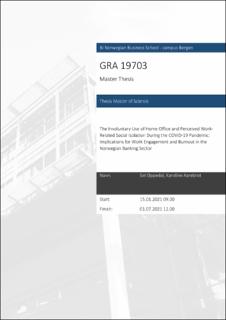| dc.description.abstract | The outbreak of the COVID-19 pandemic has led to dramatic changes in people's
everyday life and organizations have experienced a radical shift to follow the
government's restrictions. Restrictions aiming to segregate people have led
organizations to force their employees to work from home. This change to the
involuntary use of home office is predicted to have psychological effects on
employees' work engagement and well-being. Further, employees have been
prone to experiencing work-related social isolation both when working from home
and at the office due to social restrictions. This perceived isolation is suggested to
be associated with worsened mental health and reduced work engagement.
Further, this study aims to investigate whether perceived work-related social
isolation moderates the relationship between the involuntary use of home office
and work engagement and burnout. These relationships will be investigated in the
light of the Job Demands-Resource model.
We employed a cross-sectional research design containing responses from four
Norwegian banks located in western Norway, including 135 participants. The
respondents self-reported average days spent involuntarily working from home
each month during the pandemic, perceived work-related social isolation, work
engagement, and burnout. The results of our analysis indicated a significant and
positive relationship between perceived work-related social isolation and burnout
and a significant negative relationship between perceived work-related social
isolation and work engagement. Thus, the findings suggest that leaders should be
aware of whether their employees experience work-related social isolation and
meet them with sufficient resources to prevent burnout. At the same time, there
was no significant relationship found between the involuntary use of home office
and work engagement or burnout. Further, no support was found for perceived
work-related social isolation to moderate the relationship between the involuntary
use of home office and work engagement or burnout. Based on these findings,
theoretical and practical implications are discussed. Limitations and directions for
further research are also provided | en_US |
